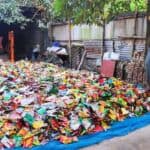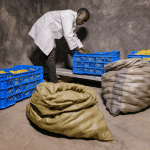Trash Talk: Why the Circular Economy Could be Sub-Saharan Africa’s Latest Leapfrog Industry
We’ve all read the articles on sub-Saharan Africa’s growing tendency to leapfrog the rest of the world in establishing widespread access to digital infrastructure and new technologies. This has been exemplified by the rapid uptake of mobile banking, peer-to-peer finance, decentralized off-grid energy solutions, drone delivery of medication such as COVID-19 vaccines, etc. Could the same thing happen with the circular economy? Could sub-Saharan Africa lead the way in popularizing waste-to-value innovations as well? An increasing number of trailblazing entrepreneurs think so.
Wasted Value: The Potential of Africa’s Waste Management Challenge
The circular economy is based on the principles of designing out waste and pollution, keeping products and materials in use, and regenerating natural systems. These approaches hold exciting potential for innovation, such as paving cities with used plastic bottles. But on a continent where more than 90% of the waste generated is disposed of at uncontrolled dumpsites and landfills, and where recycling is driven more by necessity, poverty and unemployment than by public and private sector design, there’s also a need to start at the beginning by focusing on waste management infrastructure, gradually moving towards circular economy solutions.
An increasing number of companies are implementing solutions to basic infrastructure challenges: For example, TakaTaka Solutions collects 60 tons of Nairobi’s waste every day, ultimately recycling 95% of it. And Ywaste diverts tons of food waste from South Africa’s landfills, turning it into compost. There are many more businesses pursuing similar models. The continent is now home to a growing army of companies that literally move mountains of waste – often in communities and countries with limited alternatives and infrastructure for waste management. This is creating a promising space for innovation – and potentially for the emergence of a new leapfrogging industry.
Tech-Fueled Opportunities for Scale and Innovation
Several of the companies mentioned above, as well as their peers, use technology that allows local communities to capture value from their waste, while gathering data to optimise operations and ultimately identify new revenue streams.
For instance, in Nigeria, Wecyclers uses technology to not only collect waste more efficiently, but also to reward households for their waste. According to CEO Olawale Adebiyi, “Our solution is a rewards-for-recycling platform that incentivizes people in low-income communities to capture value from recyclable waste. As they give materials to us, we reward our service subscribers with points per kilogram of recycled waste, which they can exchange for essential goods such as food and household items.”
Similar models are gaining traction across the continent. In South Africa, Regenize collects waste from households in return for “Remali” – i.e., rewards that can be used to buy groceries and other goods. And in East Africa, Mr. Green Africa has built a tech-enabled platform that manages and aggregates plastic waste and converts it to a high-quality, food-grade recycled plastic. According to co-founder and CEO Keiran Smith, “The next step for us is to build out this platform so we can manage plastic through the entire lifecycle; from consumers requesting pick-ups from their doorstep to earn points, to waste collectors becoming part of sustainable value chains, to corporates who can track that entire value chain. Through data collection, we’ll know who’s brought what to where, and where it is today.”
These examples indicate that trailblazers in sub-Saharan Africa are increasingly focused on capturing value from waste as well as creating enabling technology and infrastructure, which in some cases are considered groundbreaking even compared to global peers. For instance, countries in the E.U. that are often celebrated as “green” thought-leaders still rely heavily on waste-to-energy incineration, which increasingly is considered to “harm rather than support the transition to a circular economy.” This growing awareness of the shortcomings of previous approaches is driving the need for alternative solutions that move beyond established brick and mortar infrastructure – solutions currently pursued in sub-Saharan Africa and exemplified by the companies mentioned here.
An Impactful Value Chain
In addition to addressing the more obvious negative health and environmental outcomes of poor waste management systems, collecting waste is also a job – albeit too often an informal, dangerous one for waste pickers across the continent. Companies such as Wecyclers, Mr. Green Africa and Regenize play a significant role in formalising these value chains, ultimately creating more decent jobs.
The quality of those jobs is an important factor in the sector’s ongoing development and overall impact – and a focus of innovation for waste management businesses and other stakeholders. In South Africa, for instance, up to 90% of all the packaging and paper waste recycled is collected by the informal sector. According to Chad Robertson, co-founder and CEO of Regenize, “Often, there’s very little margin at the bottom of the value chain. But the informal waste pickers are doing most of the work. And so I don’t think we should glorify the fact that we have high recycling rates, but rather change the way that the recycling is being done, especially at the collection level.”
From South Africa to Nigeria and beyond, systems are being put in place that support companies in creating jobs that are not only safer and healthier, but that also lead to wealth creation for workers through retirement planning, entrepreneurial support, etc. For example, Fair Plastic Alliance, led by Bilikiss Adebiyi-Abiola, who also co-founded Wecyclers in Nigeria, aims to “shake the plastic quo” and make it easier for waste companies to support their workers. It does this by providing resources and guidance for safety trainings, access to health care, adherence to international labor standards, etc., ultimately promoting not only a circular economy, but an inclusive circular economy.
This ecosystem is emerging at an opportune time. An estimated 70–80% of the municipal solid waste generated in Africa is recyclable, yet only 4% is currently recycled. With the urban population in Africa increasing at a faster rate than any other continent (3.5% per year), sub-Saharan Africa is expected to become the dominant region globally in terms of total waste generation. These and other trendlines indicate ample opportunity for the continent’s circular economy businesses to grow. And new regulations suggest that the need for their services is only going to increase – from plastic bans in Rwanda and Kenya, to Extended Producer Responsibility schemes in which manufacturers take responsibility for managing the disposal of products they produce.
The time to support these trailblazers, on every corner of the continent, is now. Waste management, and ultimately the circular economy, may soon become the latest example of an African industry leapfrogging to the forefront of the world.
Note: This is the first article in a short series focused on the waste-to-value and circular economy from the BESTSELLER Foundation, which is committed to supporting the development of a circular economy ecosystem in sub-Saharan Africa by investing in trailblazers directly, and also by creating partnerships that drive more capital towards the sector. You can read the second article here.
Tine Fisker Henriksen is an Investment Manager & Head of Operations at the BESTSELLER Foundation.
Photo courtesy of the BESTSELLER Foundation.
- Categories
- Technology, WASH



